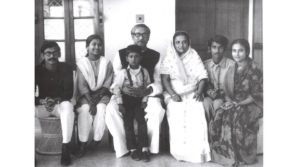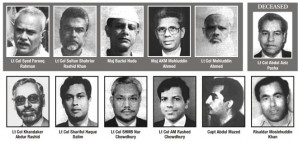
 The murder of sitting president and Founder of the Nation Bangabandhu Sheikh Mujibur Rahman, along with most of his family members, in 1975 can be judged as one of the most adverse incidents in world politics that finally left millions of people to be perpetrated by the traitors – the defeated force of the 1971 Liberation War.
The murder of sitting president and Founder of the Nation Bangabandhu Sheikh Mujibur Rahman, along with most of his family members, in 1975 can be judged as one of the most adverse incidents in world politics that finally left millions of people to be perpetrated by the traitors – the defeated force of the 1971 Liberation War.
Apart from millions of friends and admirers, Bangabandhu also had some traitors around him during the brief period in the helm of independent Bangladesh government. Those betrayers were implementing the agenda of Pakistan and the USA – to destabilise the newly-founded country which started to overcome the devastation of the bloody war of 1971.
The killers and their aides continued their efforts to protect themselves from trial for the assassinations by enacting an indemnity act and to turn Bangladesh into an Islamic state to legitimatise the power capture. They released over 11,000 local collaborators who sided with the Pakistani occupation army and committed rape, genocide, murder, torture, abduction, lootings and arson against the pro-liberation Bangalees.
Defeated evil forces like Jamaat-e-Islami, which during the war formed para militia forces like Peace Committees, razakar, al-Badr and al-Shams with the help of Pakistani army, and campaigned against Bangladesh until Bangabandhu was assassinated, were given the scope to carry out political activities publicly and establish supremacy in religion-based politics and the education system. They were also awarded with prestigious government positions.
The 1997 Awami League government annulled the indemnity act and initiated the trial, which ended in 2009. Though 12 killers, who were directly involved in the coup on August 15, have been identified, tried and five of them have been executed, six others are still on the run while one died.
 However, the task to ensure justice by identifying and trying the key planners and the mid-level plotters, many of who were believed to be foreign policymakers, has remained unobserved by the court and the governments. It’s very unfortunate in the eyes of humanity and justice since the truth is yet to be revealed.
However, the task to ensure justice by identifying and trying the key planners and the mid-level plotters, many of who were believed to be foreign policymakers, has remained unobserved by the court and the governments. It’s very unfortunate in the eyes of humanity and justice since the truth is yet to be revealed.
More important is: the betrayers – Jamaat leaders and activists – are still active in politics as a potential threat to the existence of Bangladesh, which they never wanted, and dominate business arena in some sectors, including banking. They have lifted the opposition politics to a new height of extremism to protest against the war crimes trials and a possible ban on conducting politics.
These are some of the most significant failures the people of those days committed – as they let these activities happen – and as a result, put the future generations in the most dangerous situation after the liberation.
For all these misfortune, responsible is the “culture of impunity” which was introduced and practiced by subsequent governments. At the same time, the common people failed to wage vigorous protests against such activities in independent Bangladesh. It has ultimately made the present time – 43 years after the Liberation War – alarming and thus, unliveable.
Even though the time for settling the issue is not over yet, it’s already late because it’s easy to destroy than building something. The more the anti-Bangladesh elements will be allowed to move scot free, the woes of the people will deepen further as they’ll continue to sprawl and destroy the country.
These traitors who never repented, never apologised and never came clean to build a beautiful Bangladesh holding the hands of the people, can’t be tolerated anymore to operate freely in independent Bangladesh. All the traitors must be brought to book and the detail history of Bangladesh be written and spread widely so that they can’t feel home here in Bangladesh for a minute anymore. Demons are always demons. Let’s not spare them and ensure justice for the victims first! The War of Independence is yet to finish until the traitors and their safeguards are eliminated completely.
